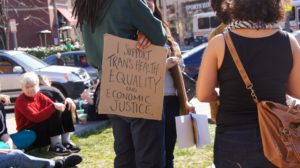 Before Bruce Jenner was famous for living in front of the camera on “Keeping Up with the Kardashians,” he was an Olympic champion, taking home the gold medal in the 1976 decathlon at the Summer Games in Montreal. Winning the decathlon gave Jenner the unofficial title of greatest athlete in the world, and secured his place as one of the best competitors the United States has ever produced.
Before Bruce Jenner was famous for living in front of the camera on “Keeping Up with the Kardashians,” he was an Olympic champion, taking home the gold medal in the 1976 decathlon at the Summer Games in Montreal. Winning the decathlon gave Jenner the unofficial title of greatest athlete in the world, and secured his place as one of the best competitors the United States has ever produced.
Nearly 40 years later, Jenner could potentially become a champion in a different respect. Recently, news reports have surfaced that the 65-year-old father of six is beginning the process of living his life as a woman.1 Though he has yet to speak out on his transition, many sources close to Jenner and his family have reported that he identifies himself as a transgender person. With that change comes the opportunity to become a leader in the fight for transgender rights, a social group against whom discrimination is still legal in many states and countries around the world.
Transgender Defined
According to the Gender Equity Resource Center at the University of California, Berkeley, the term “transgender” is an umbrella term that refers to any person whose gender identity, gender expression, or behavior does not conform to the biological gender of their birth. Transgender covers the spectrum from persons who have had surgery to be physically transformed to the other sex to persons whose identity is expressed through their clothing, grooming, or behavior. Transgender also applies to persons who identify as neither male nor female.2
What are the Rights of Transgender Persons in California?
California is among a handful of states that have specific protections against discrimination on the basis of a person’s transgender status. California Government Code sections 12940-12951 and 12955-12956.2 – the California Fair Employment and Housing Act (FEHA) – prohibit discrimination against anyone based on his or her gender, gender identity, or gender expression. The law makes it illegal for employers to discriminate against transgender employees, and for landlords to discriminate against transgender buyers or tenants.3 Services provided by the state government cannot be denied to transgender persons, nor can their participation in state funded activities be limited on the basis of their gender identity.
Federal law also protects transgender persons from employment discrimination. In 2012, the U.S. Equal Employment Opportunity Commission ruled that discrimination against a person because of his or her gender identity is considered discrimination on the basis of sex under Title VII of the Civil Rights Act of 1964, and is therefore illegal.4
In addition to the prohibitions on civil discrimination, California law provides additional protections for transgender persons against criminal discrimination. For example, California’s hate crime law (Penal Code sections 422.55-422.6) not only covers crimes motivated by race or religion, but also increases penalties for crimes that are motivated by intolerance toward transgender people.
Disclosure of Gender Identity to Others
 What about the rights of non-transgender persons in dealing with transgender persons? Do they have a right to know the biological sex of the person from his or her birth? As recently as 2013 in the United Kingdom, for example, transgender persons have actually been charged with a crime (sex by deception) for failing to reveal their biological sex prior to engaging in sexual activities.5 Privacy laws in the United States do not provide a “right to know” to the person who could potentially enter into a relationship with a transgender person.
What about the rights of non-transgender persons in dealing with transgender persons? Do they have a right to know the biological sex of the person from his or her birth? As recently as 2013 in the United Kingdom, for example, transgender persons have actually been charged with a crime (sex by deception) for failing to reveal their biological sex prior to engaging in sexual activities.5 Privacy laws in the United States do not provide a “right to know” to the person who could potentially enter into a relationship with a transgender person.
It has often been the case that transgender persons have been violently attacked for either revealing their past identity, or for withholding it. To combat this, California ended the so-called “gay panic” defense, which means that a person charged with a violent crime can no longer raise as a defense an extreme fear of gay, lesbian, or transgender persons. The court will not allow a defense that claims they were “provoked” by the sudden revelation or discovery that the person they attacked was gay or transgender.6
The Restroom Question
Inevitably, a common question that many people have about transgender rights is this: Which restroom are they allowed to use?
California law actually has an answer to that question with regard to schools. In 2013, Gov. Jerry Brown signed into law the School Success and Opportunity Act, a law that allows transgender students to use the restrooms or sports locker rooms that correspond to the gender with which they self-identify. Though the law was not without its detractors, the truth is that many school districts in California had already implemented the rule long before the law became effective. In fact, many districts, including Los Angeles Unified, have been operating according to this rule for nearly a decade before the law was passed.7
In 2014, the California Superior Court of Sacramento County held that FEHA prohibits the denial of a transgender employee’s right to use the restroom that corresponds to the employee’s gender identity. Though the decision has not taken statewide effect yet, it may signal the direction that the law will go for the rest of the state.
Marriage Rights
Since June 28, 2013, there is no longer a gender requirement for marriages in California. This means that a marriage may consist of two males, two females, or one male and one female, regardless of whether one or both were born a different sex than they identify themselves as presently. With respect to transgender persons who transitioned after their marriage, and who were married prior to the removal of the gender requirement, the transition has no effect on the legal status of their marriage.
The only requirement is that the marriage was valid at the time it was entered into by the couple.
As for federal views on California marriages with transgender persons, the rule is that if a marriage is recognized as valid within a state, the marriage must be recognized as valid by the federal government. Because California law recognizes all marriages regardless of the spouses’ gender, the federal government is bound to do the same for all purposes. However, it is important to note that federal law may not give full recognition to domestic partnerships or civil unions for all purposes.8
What Do You Think?
Do you think California’s laws do enough to protect transgender rights? Do you believe other states should follow the same policies?
Please leave your opinion in the comments below.
1. [Aili Nahas, “Bruce Jenner Is ‘Transitioning into a Woman,’ Source Confirms to PEOPLE,” People Magazine, January 30, 2015, available at http://www.people.com/article/bruce-jenner-transitioning-woman; see also Todd Leopold, “Even in age of reality TV, public gender transitions still uncommon,” CNN, February 6, 2015, available at http://www.cnn.com/2015/02/06/entertainment/feat-bruce-jenner-transitioning-in-public/.]↩
2. [http://geneq.berkeley.edu/lgbt_resources_definiton_of_terms – transgender.]↩
3. [http://www.dfeh.ca.gov/Publications_FEHADescr.htm]↩
4. [See Macy v. Department of Justice, EEOC Appeal No. 0120120821 (April 20, 2012), http://www.eeoc.gov/decisions/0120120821 Macy v DOJ ATF.txt.]↩
5. [See McNally v. R., [2013] EWCA Crim 1051, 27 June 2013, available at http://www.bailii.org/ew/cases/EWCA/Crim/2013/1051.html]↩
6. [See “California Ends ‘Gay Panic’ Defense,” at https://www.southerncaliforniadefenseblog.com/2014/11/california_ends_gay_panic_defense.html.]↩
7. [National Center for Lesbian Rights, “California Transgender Family Law:
A fact sheet for transgender spouses, partners, parents, and youth,” 2013, available at http://www.nclrights.org/wp-content/uploads/2013/07/Transgender_Family_Law_CA.pdf.
]↩
8. [National Center for Lesbian Rights, “California Transgender Family Law:
A fact sheet for transgender spouses, partners, parents, and youth,” 2013, available at http://www.nclrights.org/wp-content/uploads/2013/07/Transgender_Family_Law_CA.pdf.
]↩


